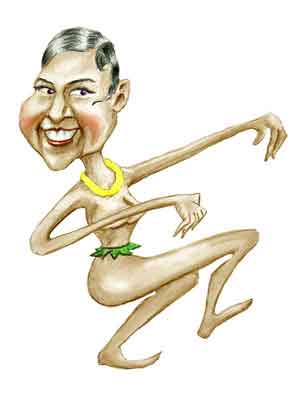Josephine Baker

Americans forget that for all their chest thumping about living in the land of the free and the home of the brave, racial discrimination was prohibited in France long before it was in the United States (the definitive US Federal law was finally passed in 1964). So although Josephine had found early success in America as a performer, when she went on a tour in Paris in 1925, she found no one really cared that she was of African descent. So she decided to stay and even became a French citizen. Naturally Americans were shocked, shocked, not only by what went on in Paris, but by the fact that an American would actually prefer to be a citizen in a country where discrimination was illegal. But as far as Josephine was concerned that was just tough tickets.
Josephine remained in Paris throughout World War II. In itself that was a pretty brave thing to do, particularly for some one of her ethnic background. But in general the occupying forces liked the cabaret life of Gay Paree, and Josephine, as was the gypsy guitarist Django Reinhardt, was pretty much left alone. In fact both she and Django had some Teutonic groupies. Being a "mere" entertainer - and a rather daring one at that - allowed her pass on information to the French Resistance that she acquired from her more loquacious (and gullible) fans. After the war she was awarded the Croix de Guerre.
But she also received a great tribute from one of the most popular and best selling authors in the world. That was the Belgian writer, Georges Simenon, author the the Inspector Maigret mystery series. His was great praise indeed, and he said ... Well, in keeping with CooperToons standard of decorum, perhaps the actual quote should be relegated to 
Shortly before her death in 1975, Josephine starred in a tribute to her life. It got rave reviews and Josephine looked pretty good, even though, as she put it, she was a 69 year old grandmother.